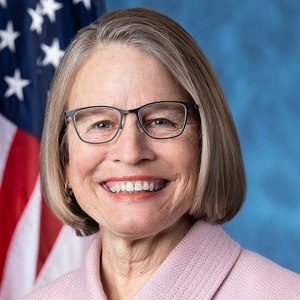Renewable Fuel for Ocean-Goring Vessels Act reintroduced in House, Senate

Rep. Mariannette Miller-Meeks, R-Iowa
March 7, 2025
Lawmakers in both the U.S. House of Representatives and the U.S. Senate on March 6 reintroduced legislation that aims to ensure that renewable identification numbers (RINs) generated for renewable fuel used by ocean-going vessels would be eligible for Renewable Fuel Standard compliance.
The legislation, known as the Renewable Fuel for Ocean-Going Vessels Act, was introduced in the House by Reps. Mariannette Miller-Meeks, R-Iowa, and John Garamendi, D-Calif, and in the Senate by Sens. Pete Ricketts, R-Neb., and Amy Klobuchar, D-Minn. Previous versions of the bill were introduced by Miller-Meeks in December 2023 and by Ricketts and former Sen. Sherrod Brown, D-Ohio, in February 2024.
Advertisement
Advertisement
The RFS currently excludes “fuel used in ocean-going vessels” from the definition of transportation fuels and from refiners’ and blenders’ obligations. Refiners and blenders are currently required to retire RINs from any biodiesel and renewable diesel used in vessels with Class 3 engines operating in international waters, including the Great Lakes. In the first 10 months of 2023, more than 5 million D4 RINs were retired under this rule.
RFS regulations, however, currently companies to generate and use RINs for “additional renewable fuel,” which includes heating oil and jet fuel. The Renewable Fuel for Ocean-Going Vessels Act would expand the RFS definition of additional renewable fuel and allow companies to use or sell the RINs associated with biodiesel and renewable diesel used in ocean-going vessels.
Advertisement
Advertisement
“Global shipping companies are looking to U.S. farmers and fuel producers to take the lead in providing clean fuels,” said Kurt Kovarik, vice president of federal affairs for Clean Fuels Alliance America. “This commonsense legislation will remove a regulatory roadblock and enable U.S. biodiesel and renewable diesel producers in partnership with soy and canola growers to meet the needs of shipping companies at a competitive price. It will allow refiners and blenders to keep RFS credits for fuel used in ocean-going vessels that are currently being sacrificed.”
“In these challenging times for biodiesel producers, expanding the marine fuel market presents a vital opportunity,” said Grant Kimberley, executive director of the Iowa Biodiesel Board. “A legislative change like this would break down a regulatory barrier that hinders U.S. biodiesel producers from meeting demand for affordable, accessible clean fuel in the marine market. Iowa’s farmers stand ready to unleash American energy with the fuel they help produce.”
Related Stories
The USDA has announced it will delay opening the first quarterly grant application window for FY 2026 REAP funding. The agency cited both an application backlog and the need to disincentivize solar projects as reasons for the delay.
CoBank’s latest quarterly research report, released July 10, highlights current uncertainty around the implementation of three biofuel policies, RFS RVOs, small refinery exemptions (SREs) and the 45Z clean fuels production tax credit.
The U.S. EPA on July 8 hosted virtual public hearing to gather input on the agency’s recently released proposed rule to set 2026 and 2027 RFS RVOs. Members of the biofuel industry were among those to offer testimony during the event.
The U.S. exported 31,160.5 metric tons of biodiesel and biodiesel blends of B30 and greater in May, according to data released by the USDA Foreign Agricultural Service on July 3. Biodiesel imports were 2,226.2 metric tons for the month.
The USDA’s Risk Management Agency is implementing multiple changes to the Camelina pilot insurance program for the 2026 and succeeding crop years. The changes will expand coverage options and provide greater flexibility for producers.
Upcoming Events










